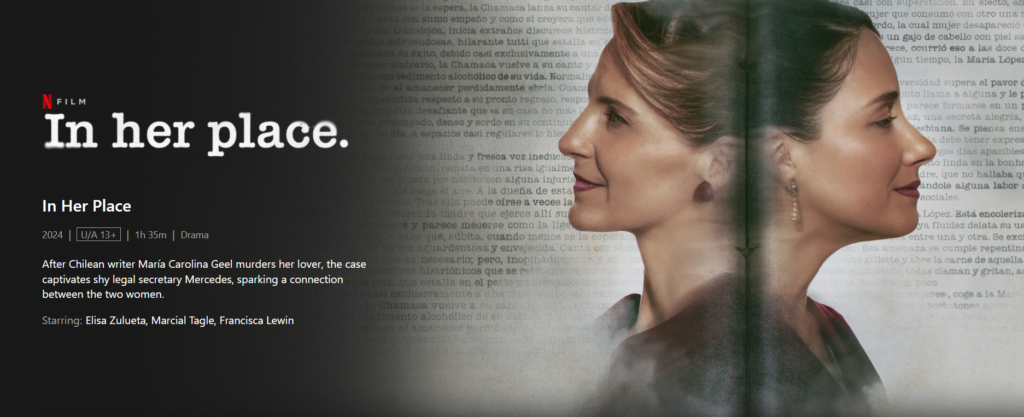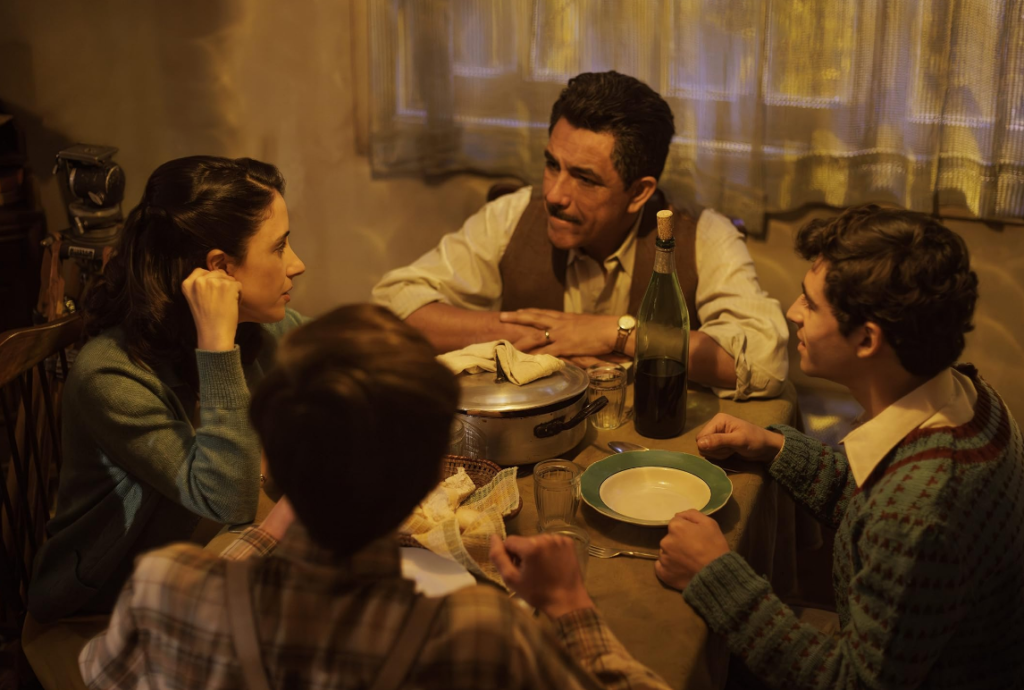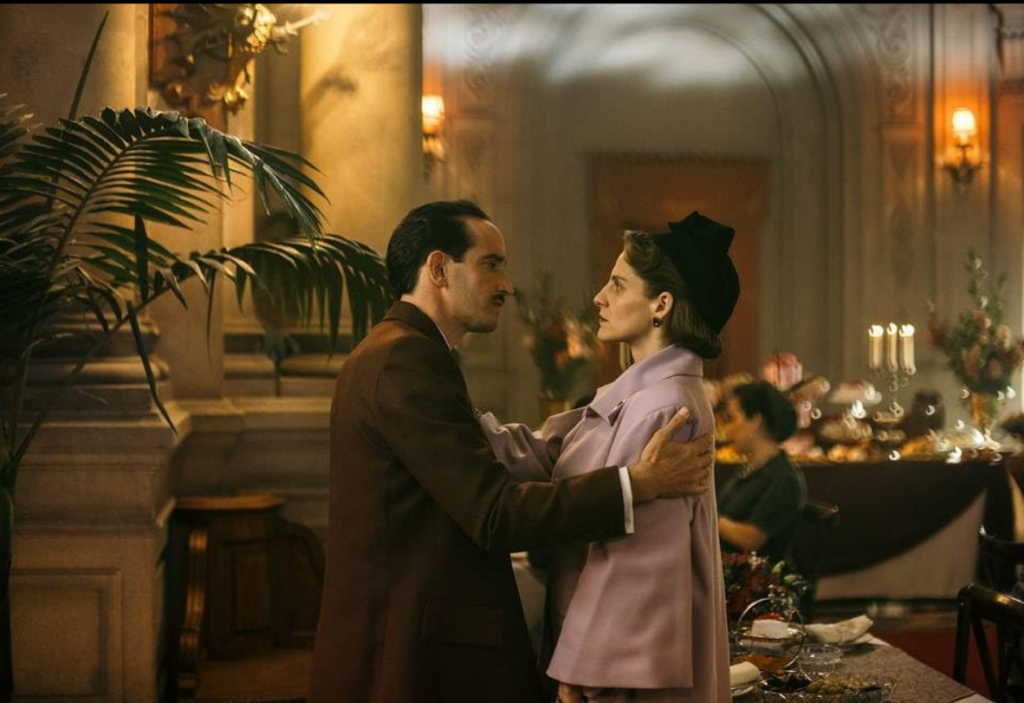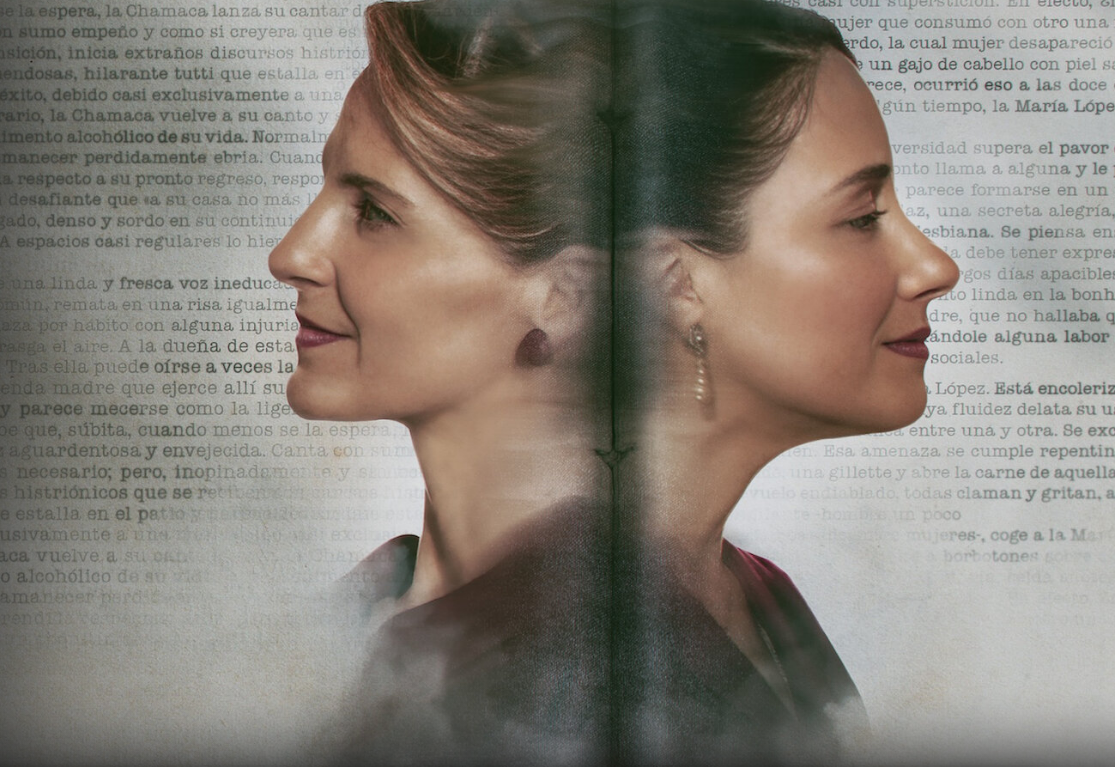Whenever I question my uniqueness or wonder if something about me is amiss, the film “In Her Place” reassures me otherwise.

Netflix
Movie Review (Character Analysis)
Maite Alberdi’s film In Her Place, inspired by an actual 50s murder in Chile and exploring obsession, identity formation, and pressures put upon women, is an exploration of these topics. At its center lies Mercedes and Maria Carolina–two women whose lives intersect, but the focus here remains Maria Carolina as she exhibits both independence and fragility at once in pursuit of self-expression through love that becomes her undoing.

Mercedes with her family
Maria Carolina, a character with complex desires, appears to have achieved happiness and independence at first. After a 13-year marriage during which she served both roles of wife and mother with equal devotion, Maria Carolina embarks upon creating her own life by forgoing traditional paths of marriage and motherhood and seeking personal fulfillment on her own. The apartment was decorated elegantly and personally to reflect her individuality and meticulous control of the environment. However, she feels an empty feeling lingering beneath the surface despite all her accomplishments and life achievements, compounded by romantic involvement with someone who offers financial support but fails to recognize the actual depth of aspirations and emotional needs of womanhood.
As the story develops, Maria Carolina’s independence and self-assurance show themselves to be two-edged. When her lover gives gifts that symbolize traditional domestic duties, like a pressure cooker and vacuum cleaner as tokens of support, he becomes symbolic of not seeing more in Maria Carolina than just homemaking duties. While these practical items might have useful applications to him, to her, they symbolize his lack of appreciation of her spirit or disregard of ambition – creating tensions between their perceptions that reflect an all too real struggle among women seeking fulfillment beyond domestic confinement.

Maria Carolina with her lover
Maria Carolina reaches her boiling point when she realizes that, despite her best efforts at expanding her identity beyond mother and wife, her lover continues to regard her only in limited terms. Maria’s outrage eventually boils over into violence as she kills him outright–an action which captures both Maria’s emotional torment as well as society’s unfair expectations about women’s roles and needs. Her subsequent act of desperation–kissing him on his grave in an effort to revive him–is touching and captures both aspects of Maria Carolina: intense love coupled with frustration as well as struggle against society-imposed limits in ways.
The film does not present Maria Carolina as an overtly hostile figure; instead, it depicts her as an intricate character with complex motives who has both relatable and troubling aspects to her behavior. Some may interpret Maria Carolina’s actions as indicative of unfulfilled desires — perhaps longing to start a family with this new partner or longstanding resentments about being restrained from reaching one’s ambitions by society’s expectations; others may perceive her more tragically–representing creative women misunderstood or restrained from fully realizing their potential within society which places traditional roles over self-realization opportunities; these interpretations of Maria Caroline is upheld throughout.
In Her Place is ultimately an exploration of how silent frustrations, social expectations, and unfulfilled potential can result in tragedy. By following Maria Carolina–an individual embodied by autonomy–this film forces audiences to confront the quiet despair many women feel when trying to balance independence with relational obligations. Maria’s story serves as an eye-opener to what happens when individuals become constrained by societal norms. It serves as a cautionary tale against unfulfilled potential.
In Her Place forces viewers to think critically about expectations placed upon women who choose lives beyond traditional gender roles, like Maria Carolina. Maria Carolina’s tragic final act illustrates the intense, often unseen pressures experienced while striving for self-fulfillment. This film allows viewers to empathize with Maria Carolina’s inner turmoil while showing us what can happen when society fails to acknowledge or honor all aspects of ambition, identity, and independence simultaneously.
Resonate myself as a woman
María Carolina’s story resonates deeply with me. It illuminates the often misunderstood strength of women who carve their own paths, women who are creative, independent, and thoughtful. Women like María, whose lives are brimming with significance beyond what’s immediately visible. Independence is not a choice to be difficult, as some may perceive. It’s a powerful way of being that nourishes the spirit and empowers us.
As a woman, I relate to María’s need for solitude, her desire for purpose, and the peace she finds in her own company. It doesn’t make her complex or distant; she values depth and integrity over superficial connections. Her openness to life and knowledge doesn’t mean she’s adopting strategies to manipulate people. She’s not playing a game; she’s living authentically, driven by curiosity and creativity. I understand that feeling—of wanting to connect with people, indeed, but only when it’s real. These genuine connections are not only valid but also essential for our well-being.
In a world where women are often expected to be the glue that holds everything together, any quietness or independence is sometimes interpreted as a weakness, even a lack of capability. But what people fail to see is that this independence is a strength, not a burden. María isn’t alone because she can’t connect or be “soft enough” for others. She’s alone because she seeks a rare connection, one where she’s valued for her own identity, not for fulfilling someone else’s idea of what she should be.
I resonate with her frustrations as well. As women, being reserved or quietly expressive doesn’t imply submission or an obligation to manage every aspect of domestic life single-handedly. A woman’s commitment to keeping a home well-organized or aesthetically pleasing shouldn’t invite scrutiny about her methods. Men often overlook that small, dismissive gestures can easily trigger deep-seated frustration. If a woman appears organized and keeps her life together, her choices and abilities deserve recognition, not a double standard of questioning.
For María Carolina, that frustration may have come from her relationship, from her partner’s inability or unwillingness to see her as more than a caretaker or “supportive” figure in his life. She wasn’t asking for much, only to be seen as her true self. As she grew older, that desire must have become even more robust as she started to feel time slipping by. For many women, the urge to build a family grows intense as they approach the end of their reproductive years. It’s not just about motherhood; it’s about creating something meaningful with someone who truly values you.
Imagine what it must have felt like for María to envision a child with her partner, only to realize he didn’t share her dreams. Her love for him was real, and perhaps she wanted more than anything to start a family with someone she could respect. But as his attention shifted to someone younger, María’s unmet dreams began to feel like betrayals—promises that had once felt possible, only to be snatched away.
Being seen as a “caretaker” or “housewife” is painful for a woman who dreams beyond those roles. While there’s nothing wrong with caring for a home or family, a woman should be able to embrace these things in her own way and on her terms. María wanted to create something lasting with her writing, to build a legacy that was her own. She wanted to be valued for her voice, her words, her mind. But too often, society expects women to give up these ambitions, or worse, to stifle them for the sake of others.
An independent woman doesn’t just want a partner; she wants someone who sees her as an equal, someone who recognizes that her dreams are just as valid as his own. It’s painful to be with someone who considers ambition as a threat rather than a shared journey. A woman like María is an asset to her partner, bringing strength and vision. But that means finding a partner who’s strong enough to see her that way.
María’s life was different from many women around her, who focused on marriage plans or family expectations. María, however, chose to walk her path, to live with respect for herself and her choices. Living alone doesn’t mean she’s lonely; it means she refuses to settle for anything less than genuine respect and understanding. Every woman has her unique blend of strengths and vulnerabilities. What we need isn’t just a partner but one who values us fully, one who supports our paths without diminishing our voices. This desire for respect and understanding is not a luxury but a fundamental need that we all share.
To be seen for who we indeed are—that’s what María wanted. And that’s what many women want. A life filled with meaning, purpose, and genuine connection. A partner who values us as we are, with dreams, frustrations, and aspirations. For women like María and women like me, that isn’t too much to ask.
